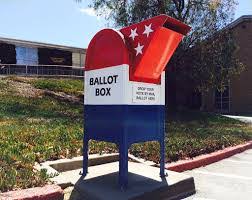GIORDANO: Looking into the Crystal Ball for 2024 Politics

Many of the most important events of 2023 are even more significant because they shape the landscape for 2024 which I think will be a more consequential year.
Despite huge voter dissatisfaction with inflation and Biden’s economy, Democrats won many important elections in 2023. They won for two reasons: the Supreme Court overturning Roe v. Wade and because of the huge edge they have in mail-in voting.
I’m in the camp that thinks abortion will not have quite as much power in the elections of 2024. However, the Supreme Court is supposed to rule in June on whether or not the abortion inducing drug Mifepristonem which can be mailed over state lines and whether it is safe. If they restrict it, this could be a key issue in 2024.
As far as the mail -in ballot, Republicans still do not the urgency needed to compete with Democrats. President Trump not his supporters to vote this way. In Pennsylvania, I’m convinced that state GOP leaders are not going all out to compete.
Activists like Scott Presler and Citizens Alliance are doing vital work in getting Republicans to use mail-in balloting, but they need a lot more resources. A sign of how intense Democrats are on this issue, is that were outside polling places in November, trying to convince Democrats to vote by mail in 2024 and registering them to receive ballots on the spot.
Probably, the most hopeful sign on the local level, was Cherelle Parker becoming the next mayor of Philadelphia. She will bring a great deal of energy and good ideas to the job. She also defeated extreme progressive and former City Councilperson Helen Gym, who would have been a disaster for the entire area.
In her victory speech, Parker drew a red line with Philadelphia District Attorney Larry Krasner over the issue of retail theft. Her statement, “You won’t be able to go in the store and steal $499 worth of merchandise and just think it’s OK,” is a direct shot at a memo Krasner sent to his attorneys about not prosecuting theft cases under $500.
Speaking of redlines, the Pennsylvania House of Representatives, Senate and Governor Shapiro recently drew another red line blocking Krasner by giving the Pennsylvania Attorney General the power to appoint a special prosecutor who can prosecute crimes that happen on SEPTA property or its vicinity. Some analysis says this power would extend over huge areas of the city.
The biggest international story with huge local implications was the October 7th Hamas savage attacks on Israelis. This attack and subsequent implied support of it by various groups across the Delaware Valley resulted in the resignation of University of Pennsylvania President Liz Magill for not explicitly condemning those calling for the state of Israel to be abolished. It also resulted in two educators on local suburban school boards to be forced to resign.
Let’s hope that Hamas is vanquished soon and peace is restored.
RFK Jr. and Taylor Swift are two people who had big impacts in 2023 and I expect even more in 2024. Kennedy’s announcement that he will run as an independent in 2024, has major parties worried. In what I think will be a very close presidential election, I think he could tip the balance in a swing state like Pennsylvania. Swift was an economic and pop culture force second to none. I believe she will intervene with young women in 2024 supporting Democrats, particularly on the issue of abortion.
The last major “personality” that I worry about for 2024 is AI. What role will AI play in upcoming elections? However, my rock-solid belief is that Delaware Valley Journal won’t have AI writing columns. See you in 2024.






